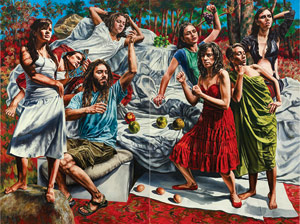The pale industrial walls of the Flood Gallery never looked better than they do backing Virginia Derryberry's Eide/Eidola, a collection of large paintings with a sun-bleached palette, a monumental style and a subject matter of idiosyncratically reinterpreted mythology.

The title derives from both Plato and Alchemy, the Idea and the Reflection of the Idea in a dance of mutual reference, like a figure moving through a hall of mirrors. The viewer may wish to know that, and then forget it until, say, a second or third viewing, to allow the sheer sensual; presence of the paintings to make a full first impression.
The Flood space might in fact be a little too narrow, for I found myself wanting to back up a few paces to take in the sweep and detail of the larger canvases. The space is often home to "experimental" work — constructions and performances and apparatuses which must be patiently explained—that Derryberry's work there is a little unsettling, like bumping into Athena in the line to pay for gas — though I suppose that is exactly the intended effect. It is a Cadillac among shows, classy and challenging, and its workday surroundings but emphasizes its distinction.
I'm a sucker for the expansion of academic style to fit contemporary, even downright weird, subject matter, and Derryberry's retooled Greek (and in one case Sumerian) myths are a feast for both the eye and the imagination. Mars and Venus, Artemis, the Seasons, genii of place and mood — few of the paintings are "straight" interpretations of the myths. Gilgamesh is a grubby hippie with puppies where his lions should be. The Goddess of the Hunt is somebody's worried mom.
Sometimes you have to read the detailed explanations on the wall to know what's going on in the paintings, though the images themselves fully communicate, separate from—or occasionally despite—their paraphrase.
The figures are predominantly female and "real" rather than picture-pretty. Women you know stand transformed into goddesses. Derryberry asserts that it is important to understand that the paintings are portraits as well as allegories. Her children and her students find themselves elevated to the plane of the mythic, which, in turn, invites us to participate in and not merely observe these ancient dramas.
Derryberry's technique always been tight, detailed, disciplined and formal, but the effect is here neither cold nor remote. The figures in these paintings, though caught in the unfamiliar territory of the divine, are compelling, human,and immediate. T
he Seven Virtues are sturdy middle-aged women, the local country club auxiliary micro-managing human virtue. The unconvincing gestures of the figures in the very large "The Seven Deadly Sins" arise from the dubiousness and dishonesty of the characters themselves. I thought at first this painting was a misfire, until I realized Derryberry was portraying evil, which in the world we know is not betrayed by horns and the smell of sulphur, but by a gesture just a little bit off, a smile not quite engaged.
My favorites are "Fall" and "Eturia," rich, melancholy pastorals. "Eturia" and the exquisite "Mars and Venus" share a fascinating gender division, a solemn female and a grinning, mischievous male, a conjunction which must mean something, though Derryberry is never so crass as to tell us what.
The element of installation in the show includes two strikingly petite dresses hanging from the ceiling. The dresses were worn by her models, and their tininess, compared to the volume they express on the canvas, is a testimony to the monumental solidity of Derryberry's style. The size 1 model becomes through the painter's will a goddess but little short of terrifying.
This is Derryberry's most important hometown show so far. Earlier shows, though complete in themselves at the time, were leading to this one, in which every goal she seems to have been setting for herself has been achieved. What tasted merely of strangeness in some of her images now possesses context and provenance; what was cool removal in the expression of her figures is now concentration and serenity. Derryberry can paint mythically. The number in the company is very select indeed.
who: Virginia Derryberry
what: Eide/Eidola
where: The Flood Gallery, Phil Mechanic Building, 109 Roberts St.
when: Through Dec. 15 (10 a.m. to 6 p.m., Tuesday through Saturday)



Before you comment
The comments section is here to provide a platform for civil dialogue on the issues we face together as a local community. Xpress is committed to offering this platform for all voices, but when the tone of the discussion gets nasty or strays off topic, we believe many people choose not to participate. Xpress editors are determined to moderate comments to ensure a constructive interchange is maintained. All comments judged not to be in keeping with the spirit of civil discourse will be removed and repeat violators will be banned. See here for our terms of service. Thank you for being part of this effort to promote respectful discussion.